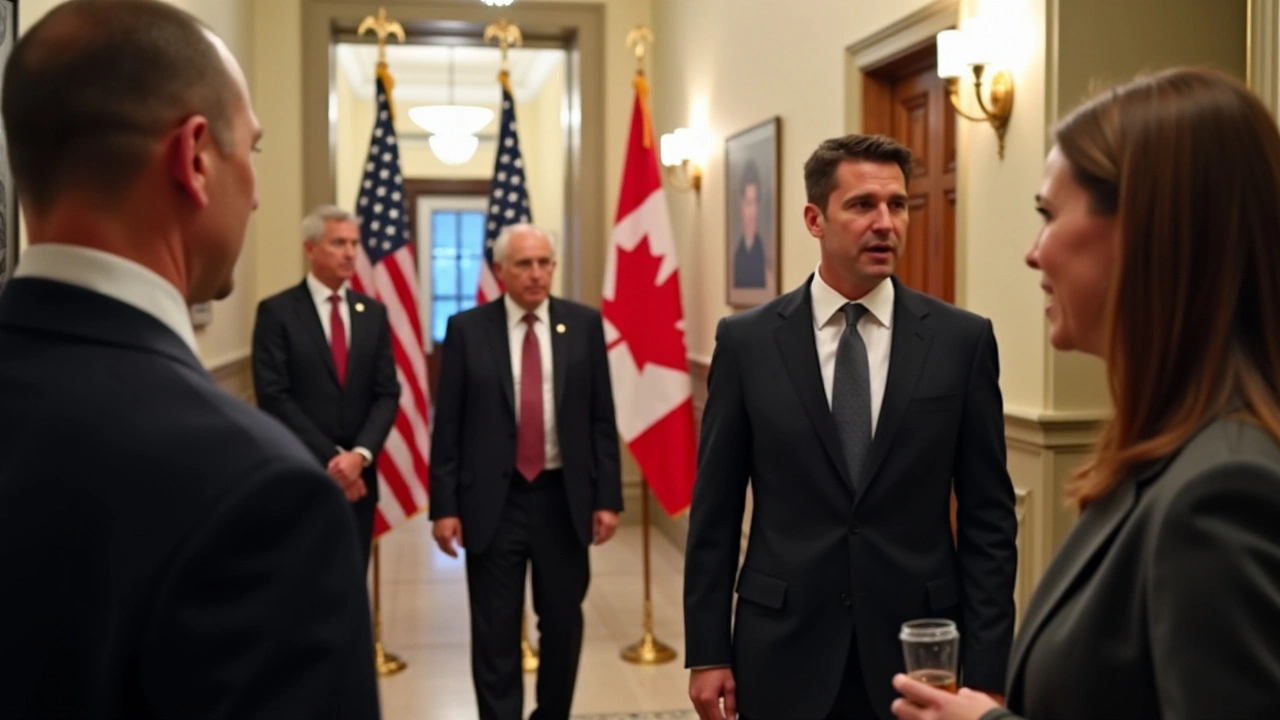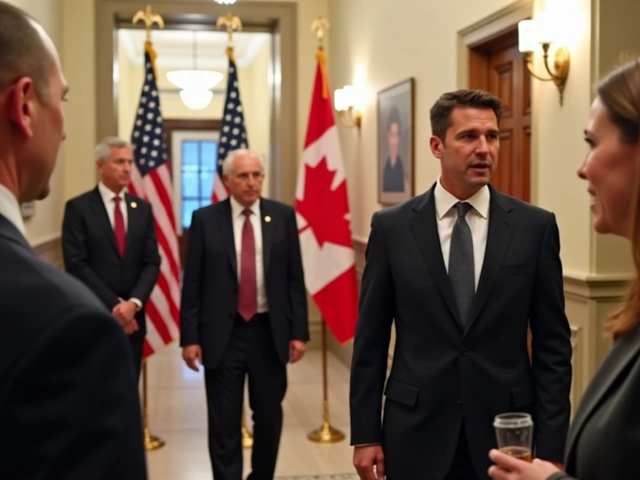
Trudeau Administration's Fiscal Target in Jeopardy
The Trudeau government is currently facing significant scrutiny as the Parliamentary Budget Officer (PBO) has published a concerning report indicating that the administration is likely to surpass its key fiscal target. The fiscal anchor, introduced by Finance Minister Chrystia Freeland last November, aimed to restrict the 2023-24 budget deficit to C$40.1 billion or less. This ambitious target was set as an attempt to demonstrate fiscal responsibility while navigating a post-pandemic economy. At the time, it was seen as a marker of the Trudeau government's commitment to carefully balancing its budgetary obligations with the need to continue investing in social programs and infrastructure. However, the latest findings reveal that this goal is slipping from reach.
Factors Contributing to the Fiscal Strain
Central to the PBO's assessment is the observation of slower economic growth than anticipated, coupled with increased government expenditures. These two factors alone have had a profound impact on the country's fiscal health. Sluggish economic activity means less revenue is being generated through taxes, leading to a significant gap between income and spending. Moreover, as the government endeavored to keep up with necessary spending on healthcare, social services, and pandemic recovery measures, expenditures have soared. This dynamic has created an environment where financial discipline is becoming increasingly difficult to maintain.
The economic climate both globally and nationally has posed unique challenges for Canada. Issues such as global supply chain disruptions, rising inflation rates, and geopolitical tensions have all played a role in dampening the economic growth outlook. As a highly open economy, Canada is particularly susceptible to these global factors. Consequently, this has put additional pressure on domestic economic performance, further complicating the government's fiscal management efforts.
Implications for Fiscal Management and Sustainability
The implications of surpassing the fiscal anchor are wide-ranging and significant for the Trudeau administration. Primarily, it raises questions about the government's capability to effectively manage its finances and steer towards fiscal sustainability. Such overshooting of the deficit target risks diminishing investor confidence and could potentially impact Canada's credit rating. This, in turn, might increase borrowing costs and complicate future investment and spending plans.
Moreover, there is growing concern among economists and political analysts about the long-term sustainability of the government's fiscal strategy. The PBO's report suggests that without serious intervention, such as substantial cuts in expenditures or a rapid acceleration of economic growth, meeting the fiscal target appears increasingly unlikely. The warning signals a need for the government to reassess its fiscal policies and possibly recalibrate its approach to maintain financial stability.
Government's Potential Strategies to Address the Fiscal Challenge
In response to the PBO's findings, the federal government may need to explore several strategies to address the fiscal challenges. One potential route could be implementing strategic spending cuts across various sectors to help reduce the overall deficit. This could include scaling back on some public programs or investing in only the most critical infrastructure projects. However, such measures need to be carefully balanced to ensure that they do not stifle economic growth or adversely affect essential services.
Additionally, the government could consider introducing policies that stimulate economic growth, targeting sectors that have the potential for rapid expansion. This might include investments in technology and innovation, supporting green energy initiatives, or facilitating small and medium business growth. Enhancing economic productivity would likely result in increased tax revenues and help close the fiscal gap.
The Road Ahead and Call for Fiscal Prudence
The PBO's report serves as a crucial wake-up call for the Trudeau administration. It underscores the formidable challenges that lie ahead in balancing ambitious spending programs with the imperative of fiscal prudence. As the political environment becomes increasingly focused on economic recovery and financial responsibility, the government's ability to adapt and implement effective fiscal strategies will be pivotal. The journey to achieving a sustainable fiscal path may require difficult decisions and a delicate balancing act, but it is vital for safeguarding Canada's economic future.
As the government navigates this complex landscape, the public and financial markets will undoubtedly be keeping a keen eye on the administration's response and subsequent actions. The decisions made in the coming months will not only have an immediate impact but could shape the longer-term economic trajectory of the nation. Transparency, accountability, and a proactive approach will be key to ensuring that the government's fiscal strategy aligns with the broader economic and social needs of Canadians.






The PBO's numbers are a red flag but Canada’s fiscal habits have always been a bit of a rollercoaster. Cutting spending now could bite the public where it hurts most. Maybe a smarter tax tweak could help.
The fiscal anchor was supposed to be a beacon of prudence, yet here we stand staring at a widening chasm.
The government promised a sleek sedan and delivered a clunky truck.
Sluggish growth is not a new villain, but pairing it with ballooning expenditures paints a bleak portrait.
Every time the Treasury tries to tighten its belt, another social program clamors for a slice of the pie.
The pandemic’s aftershocks still echo, and the temptation to keep the safety net woven is strong.
Meanwhile, the global supply chain snarls resemble a knot that refuses to untangle.
Inflation’s relentless march gnaws at disposable incomes, shrinking the tax base further.
Investors watch these moves like hawks, and a breach of the target could rattle confidence.
A downgrade in Canada’s credit rating would not just be a number; it would raise borrowing costs across the board.
The political arena is simmering, with opposition parties circling like sharks smelling blood.
Any abrupt spending cuts could ignite public backlash, especially in health and education.
Yet, a strategic pivot toward high‑growth sectors-tech, green energy, SMEs-could spark the needed revenue surge.
The government might also consider temporary tax measures that target windfall profits without harming ordinary citizens.
Transparency in how the deficit is managed will be the linchpin of restoring trust among Canadians.
In the end, balancing fiscal discipline with social responsibility is a tightrope walk that demands both prudence and vision.
While the immediate fiscal gap is concerning, it is essential to assess the long‑term implications of any abrupt policy shifts.
The report's methodology is impeccably rigorous, yet the conclusions are presented with a dash of alarmism that borders on hyperbole.
Ah, the age‑old pastime of promising fiscal restraint while simultaneously expanding the welfare state-truly a masterclass in political gymnastics.
Looks like the global elites are pulling strings again, making sure Canada stays weak so they can keep raking it in.
A balanced approach with modest cuts and targeted growth incentives is the way forward.
The deficit looms like a storm, yet hope still flickers.
Wow!! 😲 The numbers are scary!!! 💸 But we can turn this around!! 🌟 Let’s push for green tech and innovation!! 🚀
So the government says they’ll tighten belts, but the belt seems to have more holes than a cheese slicer.
Maybe they’ll start printing money next-oh wait, that’s been done already.
At this point, any solution feels like rearranging deck chairs on the Titanic.
Still, I guess a few smart tax tweaks could buy us some time.
Let’s just hope the next report isn’t a comedy.
Enough with the excuses! The public deserves a clear plan, not vague promises. Get your act together and fix the budget!